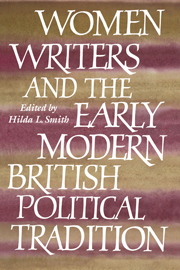Book contents
- Frontmatter
- Contents
- List of contributors
- Preface
- Introduction: Women, intellect, and politics: their intersection in seventeenth-century England
- Part I Women's political writings, 1400–1690
- Part II Women's political and philosophical writings, 1690–1800
- Introduction to Part II
- 5 Astell, Masham, and Locke: religion and politics
- 6 The politics of sense and sensibility: Mary Wollstonecraft and Catharine Macaulay Graham on Edmund Burke's Reflections on the Revolution in France
- 7 Mary Wollstonecraft on sensibility, women's rights, and patriarchal power
- 8 Emilie du Châtelet: genius, gender, and intellectual authority
- Part III The intellectual context and economic setting for early modern women
- Part IV Early modern legal and political prescriptions for women
- Conclusion: women's writing, women's standing: theory and politics in the early modern period
- Index
5 - Astell, Masham, and Locke: religion and politics
from Part II - Women's political and philosophical writings, 1690–1800
Published online by Cambridge University Press: 04 August 2010
- Frontmatter
- Contents
- List of contributors
- Preface
- Introduction: Women, intellect, and politics: their intersection in seventeenth-century England
- Part I Women's political writings, 1400–1690
- Part II Women's political and philosophical writings, 1690–1800
- Introduction to Part II
- 5 Astell, Masham, and Locke: religion and politics
- 6 The politics of sense and sensibility: Mary Wollstonecraft and Catharine Macaulay Graham on Edmund Burke's Reflections on the Revolution in France
- 7 Mary Wollstonecraft on sensibility, women's rights, and patriarchal power
- 8 Emilie du Châtelet: genius, gender, and intellectual authority
- Part III The intellectual context and economic setting for early modern women
- Part IV Early modern legal and political prescriptions for women
- Conclusion: women's writing, women's standing: theory and politics in the early modern period
- Index
Summary
Astell, Norris, and the Platonist critique of Hobbes and Locke
This chapter addresses a specific intervention in philosophy of mind debated at the turn of the seventeenth and eighteenth centuries between John Locke and Hobbesian materialists, on one side, and Cambridge Platonists, on the other, in which two women philosophers, Mary Astell (1666–1731) and Lady Damaris Masham (1658–1708), participated with as yet unacknowledged significance. Astell, a northern English gentlewoman of little means, early established her philosophical credentials with Letters Concerning the Love of God, published in 1695 at the instigation of her interlocutor, John Norris (1657–1711), Rector of Bemerton, a known Cambridge Platonist. Astell established her literary reputation, considerable in her day, as the author of a tract on women's education, A Serious Proposal to the Ladies (1694, 1697); for her Reflections upon Marriage (1700), in response to the scandalous divorce of Hortense Mazarine; and as a Cambridge Platonist and interlocutor with John Norris. On the strength of her philosophical credentials she was to enter political controversy in 1704 with three pamphlets on Occasional Conformity, the question whether occasional attendance at Anglican service sufficed as a test of state loyalty for civil servants and eligibility for office, on which religious toleration specifically turned.
Damans Masham, wife of Sir Francis Masham, and famous as the companion of John Locke, who lived with the Masham family at Oates, was the daughter of the Cambridge Platonist Ralph Cudworth (1617–88).
- Type
- Chapter
- Information
- Women Writers and the Early Modern British Political Tradition , pp. 105 - 125Publisher: Cambridge University PressPrint publication year: 1998
- 5
- Cited by

